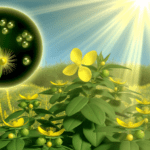Hormonal Balance and Herbal Remedies
Hormones are the body’s chemical messengers, integral to maintaining homeostasis—a stable internal environment despite external changes. They orchestrate processes such as growth, metabolism, and reproduction, ensuring that each cell and organ functions in harmony. An imbalance, whether an excess or deficiency, can lead to conditions like oxidative stress, infertility, and various endocrine disorders, impacting overall health and well-being.
Historical Use of Herbs in Hormonal Regulation
For millennia, humans have turned to the natural world for healing, with herbs playing a pivotal role in traditional medicine. Many cultures have harnessed the power of herbs to regulate hormones and address related health concerns. From the seeds of Nigella sativa to the roots of Ashwagandha, historical practices have laid the groundwork for contemporary research into the hormonal effects of these natural substances.
Challenges in Validating Herbal Efficacy
Despite historical anecdotes, modern science faces challenges in validating the efficacy of herbs for hormonal balance. Research is often limited, and the complexity of the endocrine system makes it difficult to isolate the effects of specific herbs. Moreover, misinformation and the variability of herbal concentrations in supplements add layers of complexity to determining safe and effective dosages.
Importance of Professional Guidance
Given the potential risks and the intricate nature of hormonal health, it is crucial to seek professional guidance before using herbs for hormonal balance. Healthcare providers can offer personalized advice, considering factors such as pregnancy, existing health conditions, and current medications. This approach ensures safety and enhances the potential benefits of herbal remedies within a holistic health strategy.
Nigella Sativa: Potential and Precautions
Thymoquinone and Hormonal Effects
Nigella sativa, commonly known as black cumin, is a plant with a rich history of use in traditional medicine systems for a variety of ailments. The therapeutic potential of Nigella sativa is largely attributed to its bioactive compound thymoquinone (TQ). TQ has been studied for its potential hormonal effects, particularly its influence on the endocrine system. It is believed to modulate hormonal balance, which could have implications for conditions like polycystic ovary syndrome (PCOS) and menopause.
Research on PCOS and Menopause
Recent studies have explored the effects of Nigella sativa on hormonal health issues such as PCOS and menopause. PCOS is characterized by hormonal imbalance and metabolic issues, and Nigella sativa has shown promise in regulating menstrual cycles and improving insulin sensitivity. In the context of menopause, Nigella sativa may help alleviate symptoms by acting on estrogen receptors, though the exact mechanisms require further investigation.
Usage in Cooking vs. Supplements
Nigella sativa seeds are not only a staple in culinary practices across various cultures but also consumed as dietary supplements. The seeds are known for their distinctive flavor and are often used as a spice in cooking. However, the therapeutic dosages required for hormonal balance are typically higher than what is consumed in a regular diet, leading many to opt for concentrated supplements. It is crucial to distinguish between dietary and supplemental use to ensure proper dosages for health benefits.
Safety and Research Gaps
While Nigella sativa is generally considered safe for consumption, there are potential side effects and interactions with medications that must be acknowledged. Pregnant and breastfeeding women, as well as individuals on specific medications, should exercise caution. Moreover, despite promising findings, there are research gaps in the long-term safety and efficacy of Nigella sativa for hormonal health. Clinical trials with larger sample sizes and standardized extracts are needed to validate the therapeutic claims and establish comprehensive safety profiles.
Ashwagandha: Stress, Cortisol, and Thyroid Hormones
Adaptogenic Properties and HPA Axis
Ashwagandha, scientifically known as Withania somnifera, is a revered herb in Ayurvedic medicine, celebrated for its adaptogenic properties. Adaptogens are natural substances that help the body adapt to stress and exert a normalizing effect upon bodily processes. Ashwagandha specifically targets the body’s hypothalamic-pituitary-adrenal (HPA) axis, which orchestrates the body’s response to stress. By modulating this system, ashwagandha can influence the production and release of cortisol, the body’s primary stress hormone, and thereby help maintain hormonal balance.
Clinical Studies and Results
Several clinical studies have investigated the effects of ashwagandha on stress and hormonal balance. A notable study in 2019 involving 60 adults demonstrated that consumption of 125–300 mg of ashwagandha root extract twice daily over 8 weeks resulted in a significant reduction in stress, improved sleep quality, and decreased blood cortisol levels compared to a placebo. These findings are supported by earlier research, such as a 2012 study that observed similar stress-relieving outcomes.
Impact on Other Hormones
Ashwagandha’s influence extends beyond the HPA axis and cortisol. Research has explored its effects on various other hormones, including those related to the thyroid and reproductive systems. For instance, a study conducted in 2018 found that adults with elevated thyroid-stimulating hormone (TSH) levels experienced an improvement in their hormone profiles after taking 600 mg of concentrated ashwagandha extract daily. This suggests a potential benefit for individuals with thyroid conditions such as hypothyroidism.
Contradictory Findings and Side Effects
Despite the promising results, not all studies have found ashwagandha to be effective, and some have reported side effects. The herb may not be suitable for everyone, particularly those who are pregnant, breastfeeding, or have certain autoimmune diseases or thyroid disorders. Side effects reported during clinical trials include headaches, sleepiness, and gastrointestinal discomfort. It is crucial to approach the use of ashwagandha with caution and to consult with a healthcare professional before starting any new supplement regimen, especially given the potential for interactions with other medications and conditions.
In summary, ashwagandha’s adaptogenic qualities may offer a natural approach to managing stress and supporting hormonal health. While clinical studies have shown promising results, particularly in reducing cortisol and improving thyroid function, further research is needed to fully understand its impact on hormonal balance and to clarify the potential for side effects.

Bette 100% All-Natural Relaxing Lavender Body Lotion.
Chemical-Free
Your relaxing night time body moisturizer to leave the day’s stress behind. Decompress and wish your body good night with the calming scent of lavender.
Black Cohosh: Women’s Health and Menopause
Historical and Current Uses
Black cohosh (Actaea racemosa or Cimicifuga racemosa), a member of the buttercup family, has been used for centuries to support women’s health. Native Americans utilized black cohosh for a variety of conditions, including musculoskeletal pain, fever, and reproductive issues. European settlers adopted the herb as a tonic for women’s reproductive health. Today, black cohosh is primarily recognized for its potential to alleviate menopausal symptoms such as hot flashes, night sweats, vaginal dryness, and mood swings.
Phytoestrogenic Properties
The active compounds in black cohosh, including triterpene glycosides like actein and cimicifugoside, are believed to contribute to its medicinal properties. Although the exact mechanism of action is not fully understood, black cohosh is thought to have phytoestrogenic effects. Phytoestrogens are plant-derived compounds that can mimic the activity of estrogen in the body. This estrogenic activity may help to compensate for the lower levels of estrogen experienced by women during menopause, potentially easing related symptoms.
Clinical Efficacy and Safety Concerns
The efficacy of black cohosh in treating menopausal symptoms has been the subject of numerous studies, with mixed results. Some research suggests that black cohosh can provide relief from vasomotor symptoms more effectively than a placebo. However, a definitive conclusion on its effectiveness cannot be drawn due to variations in study design, formulation, and duration. Safety is another important consideration; while black cohosh is generally well-tolerated, there have been reports of gastrointestinal upset and rashes. More seriously, there have been rare cases of liver damage associated with its use, although a direct causal relationship has not been established. Due to these concerns, it is recommended that black cohosh be used under the guidance of a healthcare professional, especially in individuals with liver disorders or those who are pregnant.
In conclusion, black cohosh remains a popular herbal remedy for menopausal symptoms, with historical and current uses grounded in its phytoestrogenic properties. While some women may find relief with black cohosh, the scientific community continues to investigate its clinical efficacy and safety profile. As with any supplement, it is crucial to consult with a healthcare provider before beginning use, particularly for those with pre-existing health conditions or concerns.

Chasteberry: Prolactin and Reproductive Health
Mechanisms of Hormonal Influence
Chasteberry, derived from the Vitex agnus-castus tree, is a well-known herbal supplement that has been used for centuries to address women’s health issues. The primary mechanism by which chasteberry influences hormonal balance is through its impact on the pituitary gland. This gland is responsible for producing and regulating various hormones, including prolactin. Chasteberry appears to exert a dopaminergic effect, which means it can increase dopamine levels in the brain, thereby inhibiting the secretion of prolactin. Elevated prolactin levels are often associated with conditions such as premenstrual syndrome (PMS), menstrual irregularities, and even infertility. By modulating prolactin, chasteberry helps to restore hormonal equilibrium, particularly in relation to reproductive health.
Efficacy in Treating PMS and Other Conditions
Chasteberry has been studied for its efficacy in treating PMS symptoms, with several studies indicating a reduction in symptoms such as breast tenderness, mood swings, and headaches. Its potential benefits extend to other reproductive health issues as well. For instance, chasteberry has been used to help regulate menstrual cycles, and there is some evidence to suggest it may improve fertility outcomes in women with luteal phase defects. Additionally, its role in managing symptoms of menopause has been explored, although results are mixed and warrant further investigation.
The Need for Further Human Research
Despite the promising effects of chasteberry on hormonal balance, there is a consensus among scientists that more rigorous, high-quality research is needed. Many of the existing studies have limitations, such as small sample sizes, short durations, or lack of control groups. Furthermore, the exact dosage and long-term safety profile of chasteberry supplements remain unclear. To fully understand the therapeutic potential and safety of chasteberry, well-designed clinical trials involving larger populations and longer follow-up periods are essential. Such research will help to validate the traditional uses of chasteberry and potentially pave the way for its integration into conventional medical practice for hormonal regulation.
Marjoram: Insulin, Cortisol, and PCOS
Bioactive Compounds and Medicinal Properties
Marjoram, known scientifically as Origanum majorana, is a perennial herb with a rich history in culinary and medicinal applications. Its leaves contain a plethora of bioactive compounds, including flavonoids and phenolic acids, which are believed to contribute to its medicinal properties. These compounds exhibit antioxidant activity, which may play a role in modulating oxidative stress, a factor implicated in various metabolic disorders, including polycystic ovary syndrome (PCOS).
Research on Hormonal Impacts
Emerging research has begun to shed light on the potential hormonal impacts of marjoram, particularly concerning insulin and cortisol levels. A small human study indicated that the consumption of marjoram tea twice daily led to significant reductions in fasting insulin levels among participants with PCOS, suggesting improved insulin sensitivity. Additionally, animal studies have shown that marjoram extract may influence the levels of estradiol, a hormone produced by the ovaries, hinting at its potential to modulate hormonal balance in PCOS.
Safety and Long-Term Use
While marjoram has been used safely in cooking for centuries, the safety profile of its concentrated forms, such as extracts or supplements, requires careful consideration. The long-term use of any substance that can alter hormone levels warrants caution. As with all herbal remedies, potential interactions with medications and conditions unique to the individual must be taken into account. Therefore, it is crucial to consult with a healthcare professional before incorporating marjoram supplements into a regimen for hormonal balance, especially for conditions as complex as PCOS.
By the way, something for you, a little gift!!!
I am just in the middle of publishing my book. It’s about How women can balance their hormones. One part is about food and diet, of course.
Follow this link and enter your email.
I will send you this part of the book for free once the book is published. It has many concrete, practical tips and recipes and will help you feel better during menopause or times of Big hormonal fluctuations.
Annette, Damiva Lead for Health & Wellness

Holistic Approaches to Hormonal Balance
Diet and Hormonal Regulation
The foods we eat play a crucial role in maintaining hormonal equilibrium. A diet rich in lean proteins, healthy fats, and high-fiber foods can positively influence hormones that regulate appetite, metabolism, and mood. Conversely, excessive intake of processed sugars can disrupt these delicate systems. Incorporating phytoestrogens—plant-derived compounds with estrogen-like effects—into the diet can be particularly beneficial during menopause, provided there is no risk of estrogen-dependent conditions. Foods such as flaxseeds, soy, and certain nuts are rich in these compounds and can support hormonal balance.
Lifestyle Factors: Exercise, Stress, and Sleep
Regular physical activity can modulate appetite hormones and enhance insulin sensitivity, contributing to overall hormonal health. Stress management is equally important; chronic stress can lead to imbalances in cortisol and adrenaline levels. Techniques such as yoga, meditation, and spending time in nature can help mitigate stress. Adequate sleep is also vital; disruptions in sleep patterns can affect melatonin and cortisol levels, potentially leading to insulin resistance. Thus, maintaining a healthy lifestyle that includes exercise, stress reduction, and sufficient sleep is essential for hormonal balance.
Avoiding Endocrine Disruptors
Endocrine disruptors are chemicals that can interfere with hormone function. These can be found in everyday items such as plastics, pesticides, and personal care products. To minimize exposure to these harmful agents, opt for organic produce when possible, use glass or stainless steel instead of plastic containers, and choose personal care products with natural ingredients. By reducing contact with endocrine disruptors, you can help maintain your body’s natural hormonal rhythms.
Integrating Herbal Remedies with Other Treatments
While herbs like Nigella sativa, ashwagandha, black cohosh, chasteberry, and marjoram have shown promise in balancing hormones, they should be used as part of a comprehensive approach that includes diet, lifestyle changes, and conventional medical treatments when necessary. It is imperative to consult with a healthcare professional before starting any herbal regimen, especially for individuals with pre-existing conditions or those taking other medications. This ensures safety and maximizes the potential benefits of herbal remedies in harmony with other treatments.
In conclusion, achieving hormonal balance is a multifaceted endeavor that encompasses a nutritious diet, active lifestyle, stress management, adequate sleep, avoidance of harmful chemicals, and the judicious use of herbal remedies. By adopting a holistic approach, individuals can support their endocrine health and improve their overall well-being.










